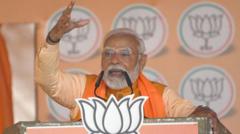The BJP's victory indicates a significant shift in Delhi's political landscape as it prepares to tackle pressing challenges ahead.
Modi's BJP Claims Major Victory in Groundbreaking Delhi Elections

Modi's BJP Claims Major Victory in Groundbreaking Delhi Elections
In a stunning electoral turnaround, PM Narendra Modi's BJP secures a decisive win in Delhi, ending AAP's 27-year hold on the capital.
In a remarkable electoral outcome, Prime Minister Narendra Modi's Bharatiya Janata Party (BJP) has secured control of the Indian capital, Delhi, ending a 27-year governance by the Aam Aadmi Party (AAP). The BJP is currently leading in 47 out of 70 assembly seats, with AAP claiming 23, according to the latest figures from the Election Commission of India (EC). Securing over 35 seats allows the BJP to form the government, marking a significant feat given the party's absence from power in Delhi since 1998.
Modi hailed the election results as a victory for development and good governance, promising that his government would work tirelessly to advance the interests of the capital. The contest held considerable significance for both parties, with the BJP seeking a strategic foothold in the capital and AAP attempting to maintain its longstanding governance built on welfare policies.
Despite a strong performance by AAP in previous years, recent allegations of corruption involving its key leaders have marred its reputation. The party’s leadership has denied these accusations, yet they appear to have impacted voter trust. AAP, which has been in power since 2013, slipped into a difficult position with top leaders, including Arvind Kejriwal and Manish Sisodia, facing significant defeats in key constituencies during this election cycle.
In the aftermath of the election, Kejriwal expressed humility in accepting the electoral outcome, wishing the BJP success in meeting the expectations of their new constituents—a sign of the competitive yet turbulent political climate in the capital.
Experts highlighted that the BJP utilized significant resources and crafted a campaign focused on stability and effective governance, responsible for winning over many voters. The party's recent victories in states like Maharashtra and Haryana have fueled this upward momentum, and Delhi's win only amplifies that surge.
While the campaigns of both parties emphasized improvements in public services and welfare, the discourse largely sidestepped the critical issue of air pollution—an ever-persistent problem affecting millions in Delhi.
As the BJP prepares to govern Delhi for the first time in nearly three decades, both opposition and voters will be watching closely to see how it addresses the lingering challenges ahead, particularly against a fragmented opposition landscape.
Modi hailed the election results as a victory for development and good governance, promising that his government would work tirelessly to advance the interests of the capital. The contest held considerable significance for both parties, with the BJP seeking a strategic foothold in the capital and AAP attempting to maintain its longstanding governance built on welfare policies.
Despite a strong performance by AAP in previous years, recent allegations of corruption involving its key leaders have marred its reputation. The party’s leadership has denied these accusations, yet they appear to have impacted voter trust. AAP, which has been in power since 2013, slipped into a difficult position with top leaders, including Arvind Kejriwal and Manish Sisodia, facing significant defeats in key constituencies during this election cycle.
In the aftermath of the election, Kejriwal expressed humility in accepting the electoral outcome, wishing the BJP success in meeting the expectations of their new constituents—a sign of the competitive yet turbulent political climate in the capital.
Experts highlighted that the BJP utilized significant resources and crafted a campaign focused on stability and effective governance, responsible for winning over many voters. The party's recent victories in states like Maharashtra and Haryana have fueled this upward momentum, and Delhi's win only amplifies that surge.
While the campaigns of both parties emphasized improvements in public services and welfare, the discourse largely sidestepped the critical issue of air pollution—an ever-persistent problem affecting millions in Delhi.
As the BJP prepares to govern Delhi for the first time in nearly three decades, both opposition and voters will be watching closely to see how it addresses the lingering challenges ahead, particularly against a fragmented opposition landscape.



















